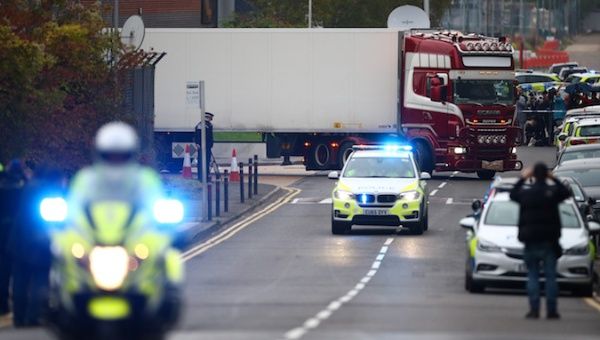Vietnamese Migrants Found Dead in UK Truck Were Fleeing Poverty


Orinoco Tribune – News and opinion pieces about Venezuela and beyond
From Venezuela and made by Venezuelan Chavistas

Thousands of Vietnamese people risk an expensive and precarious journey to reach European lands, such as the 39 killed in Essex, who came from the central and northern provinces of the Asian country.
Vietnam is mourning on Friday, after it was confirmed that the 39 migrants who were recently found dead in a truck in the English county of Essex were Vietnamese, mostly from the Southeast Asian country’s poor and rural areas.
The Vietnamese government confirmed the identity of the victims late on Thursday and expressed its condolences to the families and friends of the migrants, who had paid up to US$40,000 to people on their way in the hope of finding a better life in the United Kingdom.
The discovery of the bodies in a container on an industrial estate near London has shone a spotlight on the migration of poor people of Asia, Africa and the Middle East on perilous journeys to the West.
RELATED CONTENT: Neoliberalism’s Children Rise Up to Demand Justice in Chile and the World
The victims came from six provinces – Haiphong, Hai Duong, Nghe An, Ha Tinh, Quang Binh and Hue – Vietnam’s Ministry of Public Security said in a statement.
The bodies were found in the early hours of Oct. 23 after the container arrived from Zeebrugge in Belgium. The container was picked up at Purfleet dock, east of London and police originally said the victims were believed to be Chinese.
The driver of the truck has been charged with 39 counts of manslaughter, conspiracy to traffic people, and money laundering.
Eight people were arrested earlier this week by Vietnamese police, bringing the total number of arrests there to 10.
Vietnam’s growth with the economic neoliberal turn in the late 1980s has mainly impacted urban dwellers in the large cities and quickly backlashed, excluding the inhabitants of the most rural and poorest provinces, where the only way most people could hope for improved living conditions is by moving to big cities or abroad.
According to the United Nations, the average salary in Vietnamese cities is double that of what one makes working in the fields in rural areas.
“Hundreds of thousands migrate to the industrialized peripheries of Hanoi and Ho Chi Minh City. Tens of thousands go to other countries in Southeast Asia or Asia. And a few thousand go to Europe, which costs a lot of money and is very difficult to organize,” Nicolas Lainez, a research associate at the Paris-based Center for Southeast Asia (CASE), told EFE.
Away from the main cities, without tourist attractions and hit every year by typhoons and storms – phenomena that are aggravated by the climate crisis – people from provinces such as Nghe An and Ha Tinh have become accustomed to the idea of emigrating for a better life since the time of the Cold War.
At that time, a program to emigrate to countries in the Eastern Bloc was launched by the communist regime in Hanoi in 1975, thus fostering in the area a “tradition” that has remained until now.
In recent years, the UK appears to have emerged as a preferred destination in Europe.
Featured image: Police move the lorry container where bodies were discovered, in Grays, Essex, Britain October 23, 2019. | Photo: Reuters